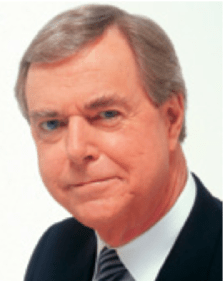Diplomacy as Crisis Management
Column / Don Newman
It is a different world. And a different way of dealing with it.
In their time Henry Kissinger, George Kennan, Eduard Shevardnadze and Canadians like Lester Pearson dominated the headlines as they travelled from international conference to private meetings, brokering agreements, negotiating treaties, and generally providing the grease to smooth international relations.
Many, like Kissinger and Pearson, were bigger names and seemed more important that the political leaders they served. Would there have been the Middle East peace brokered by Kissinger after the Yom Kippur war in the first half of the 1970s when his patron Richard Nixon was going down a under the weight of the Watergate scandal? Kissinger’s role in US foreign policy — particularly during the 1960s and 70s when the term “shuttle diplomacy” was coined by Kissinger deputy Joe Sisco to describe the then-secretary of state’s flight trajectory during his successful 1973 effort to end the Yom Kippur War — was indisputable, from Vietnam to the Middle East to China.
Would there have been the invention of United Nations peacekeepers that eased the tension of the Suez Crisis in 1956 had Canadian “Mike” Pearson not led the way, while Prime Minister Louis St. Laurent stood behind supportively in Ottawa letting his External Affairs minister call the shots in New York?
In Canada, the last diplomat to play a multilateral role of real significance was former Foreign Affairs Minister Lloyd Axworthy. He led the international charge against big players like the United States and Russia to win support for the 1997 Ottawa Treaty on land mines. That was an effort that combined both the old diplomacy — Axworthy worked his international connections like a diplomat of old — but also had the sophisticated support of the internet and other modern media to amplify his message to “civil” society as he pressed to get the land mines agreement ratified.
Like Pearson before him, Axworthy was nominated for the Nobel Peace Prize. Unfortunately, unlike Pearson, Axworthy did not win. But his name is attached to a major international initiative that survives and has been a success.
Axworthy’s land mines treaty came at the end of an era. We didn’t know it at the time, but we do now. Foreign policy and international affairs have passed from the “experts” at foreign ministries and embassies to a much larger community of specialized interests, often connected to each other beyond the conventional foreign policy hierarchy based on the small world of the internet. Sometimes the various interests will have common goals. Sometimes they will not.
As it is with many things in the third decade of the 21st century, China is a good example of how diplomacy has been transformed. Canada has been represented in Beijing by a series of accomplished diplomats, including David Mulroney and Guy Saint Jacques as ambassadors and Charles Burton as a high-ranking official. But when Canada-China relations plunged to an historic low, a new diplomatic approach was necessary.
Following traditional diplomatic practices, on December 1, 2018, Canada detained Meng Wenzhou, the chief financial officer of Huawei, on an American extradition request as she passed through Vancouver Airport. China then seized two Canadians in China, Michael Spavor and Michael Kovrig, in retaliation. It said Canada was acting as an American lackey doing Washington’s bidding, and that neither of the “Two Michaels” would be coming home until Meng was released.
After some traditional diplomatic approaches failed, someone in Ottawa thought outside of the box. The Trudeau government approached Dominic Barton, a Canadian who was the former managing partner of McKinsey, a global consultancy with connections all over the world. Barton had given the government economic advice in the past, but now he was needed instead for his wide web of connections at the highest level of the Chinese government, which he had developed while serving as head of McKinsey Asia, based in Shanghai.
Despite its world-wide reach as the largest of the “Big Three” management consultancies, McKinsey is an American company. It specializes in problem-solving and crisis management. Barton and his colleagues had the connections in Washington as well as Beijing to make things happen. With no official diplomatic experience, Barton was suddenly appointed Canadian ambassador to China and went to work. On September 24, 2021, within a year of Barton’s appointment, the “Two Michaels” and Meng were flying in opposite directions across the Pacific.
While Canada-China relations remain strained, the Barton example of using people with special talents and connections to resolve specific problems in addition to traditional diplomatic practitioners is illustrative of the ways the new, 21st-century diplomacy is evolving.
Contributing writer and columnist Don Newman, an Officer of the Order of Canada and Lifetime Member of the Parliamentary Press Gallery, is Executive Vice President of Rubicon Strategy, based in Ottawa.

